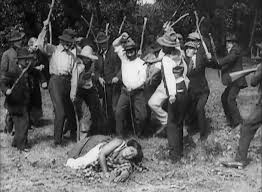
"I've sold my birthright. All for a miserable mess of pottage."
The remarkable Oscar Micheaux went from Pullman porter, farmer and novelist to Hollywood's first successful black director. His earliest surviving work, Within Our Gates (1920), offers a clunky but powerful portrait of racism.Sylvia Landry's (Evelyn Preer) caught in a messy love triangle with her fiancée Conrad (James D. Ruffin) and jealous cousin Alma (Flo Clements), culminating in blackmail and murder. Fleeing in disgrace, Sylvia joins the Piney Woods School, a school for black children, and travels to the North on a fundraising mission. She meets resistance from hostile whites and indifferent blacks, but finds comfort from Dr. Vivian (Charles D. Lucas). Dr. Vivian falls for Sylvia, but Alma again threatens to unravel their relationship by revealing Sylvia's shameful past.
Critics commonly treat Within Our Gates as a riposte to D.W. Griffith's Birth of a Nation (1915). But Micheaux could draw not only upon Griffith's racist masterwork, but the previous year's Red Summer, which saw race riots extending from Chicago to Elaine, Arkansas. Lynchings remained tragically common, making the film's climax disturbingly real. Micheaux's heroine is the product of interracial rape, a defilement too often visited upon blacks by their social "superiors," from genteel plantation owners to sleazy sharecroppers.
Gates offers a thoroughgoing assault on white supremacy, from its opening title card mocking Northern pretenses to racial tolerance. Whites dismiss the idea of educating blacks ("Can't you see that thinking would only give them a headache?"), while newspaper inserts highlight Jim Crow legislation restricting black suffrage. Micheaux also gives his heroine surprising agency; no fainting Lillian Gish, Evelyn Preer's Sylvia proves dogged in promoting her cause and bettering education. Gates exposes the bigotry coursing through the veins of early 20th Century America, affecting events from politics to daily life.
Micheaux equally scorns blacks complicit in white supremacy. There's Old Ned, an itinerant preacher who encourages blacks to abandon education for Jesus, and who acts the Sambo stereotype for his white "betters." In private he's shown to be painfully aware, and bitterly ashamed, of his roleplaying. Similarly, the success of Sylvia's father (William Stark), apprenticing with a white oligarch (Ralph Johnson), triggers resentment and a false murder charge. Demands that blacks better themselves before gaining equality are self-defeating; through success, blacks like Jasper advance from amusing nuisance to threat. African-Americans can't win, whether they collaborate, conform or rebel.
Admittedly, Gates lacks the operatic grace of Griffith or Sergei Eisenstein: its melodramatic plot clunks and the movie occasionally drags. Yet the climactic flashback more than compensates in its raw, forceful dynamism. It's a painfully protracted scene of lynching and attempted rape, spitefully turning Birth of a Nation's climax on its head. Griffith's Wagnerian Klansmen become a frothing mob who happily murder a groveling servant (E.G. Tatum) along with the "guilty" Jasper. The ending plays without voyeurism or honorable redemption, offering instead a scintillating vision of hatred.
Within Our Gates ends on an incongruously upbeat note. Dr. Vivian lectures Sylvia, and the audience, that blacks should take pride in their accomplishments and bless America. After he's subjected us to racism's ugliest manifestation, Micheaux's assurances ring remarkably hollow. It doesn't erase the potent message and powerful images we've absorbed, and which make Gates an enduring artwork.

